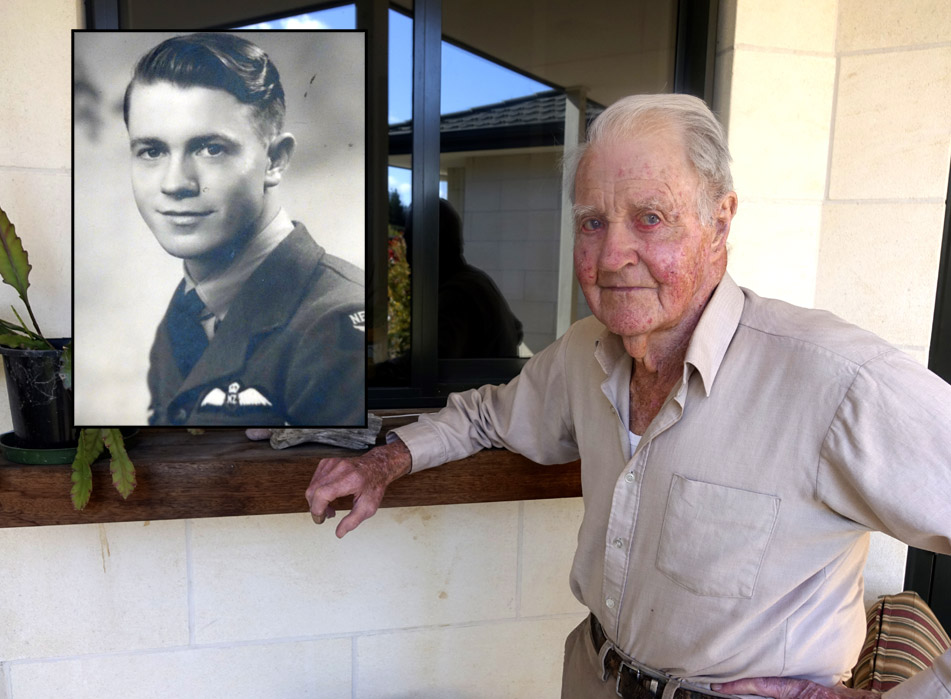
“If you can avoid really hating somebody (do so), because gosh we are all made differently,” he said.
As a Rokeby farmer in his younger days Colin would prefer to walk than take his ute.
“I would get chastised on the ‘why do you walk around the the farm and not use a ute?’ people would ask, it’s what I liked doing.”
Even now Colin tries to walk a mile or two every day; walking alongside the Ashburton River is one of his favourite walking spots.
Born in Fairlie and brought up on his father’s sheep and cropping farm, Colin ploughed the fields with a team of six clydesdales.
His father, who died young, wanted Colin to have an office job rather than farm, so after finishing school he took an insurance job in Wellington.
Then, when he turned 18 – and got permission from his mother – he was accepted into the Air Training Corp and did military training which included throwing live grenades.

“Jokers dropping them on the ground after pulling the pin, giving you a heart attack,” Colin said.
The recruiters then “talked you into what they wanted you to do, not what you wanted to do,” he said.
“I wanted to be a fighter pilot, like a lot,” he said.
But they sent him to Ashburton to train as a pilot “not a fighter pilot.”
Colin trained in Tiger Moth and Oxford planes and was awarded his wings in Wigram in 1944.
After getting his wings Colin was sent to England on a merchant ship loaded with meat.
“It took quite a while to get to the UK because we went across the Pacific and through the Panama Canal which was fairly unusual,” he said.
“It was marvellous.”
One night as the ship made its way across the Atlantic the alarms were sounded.
“In the middle of the night the sirens went off because there was a submarine so we were thinking this is it boys, but it was a friend, a British sub.”
Once in Britain the training started again.
“Bit more Tiger Moth, a bit more Oxford, I was even on a bombing range with Typhoons.”
Colin soon discovered training can be as dangerous as combat.
“I was being instructed how to do an emergency landing with one motor, but my instructor got a bit low didn’t he, I almost grabbed the stick because I was sure we would hit something, and sure we hit all right but we were lucky it was an old stone fence, we didn’t crash, managed to go around again, they had the meat cart ready for us,” he said.
“That was end of me training with that joker, I had lost faith.”
After being told he could fly well, 19 year old Colin got a promotion and a Wellington bomber to pilot along with a crew, some of which were a higher rank and more experienced.
“The jokers seemed to have faith in me, so that was good, one guy had done a tour of operations in the Pacific but his language was a bit hot for the WAF’s (Women in the Air Force).”
Although the war had finished in Europe, the Japanese held out in the Pacific so the crew trained as though on missions and practiced dropping bombs.
“We were going to go into a bigger bomber, bigger than the superfortress, but that never happened because then they dropped the atomic bomb, and bang it was all over, the war ended.”
Reflecting on missing combat Colin said “more than likely I wouldn’t be alive if we had gone to war, you took your life in your hands.
“There were several pilots I knew when I was at Wigram who went to the Pacific and never came back.”
After the war he resumed his insurance job in Wellington, but being stuck in an office no longer suited him, and he returned to the family farm where is mother still lived.
“I wanted to make a fresh start,” he said.
He meet his late-wife Alison while ploughing at his uncle’s farm, and purchased a sheep and crop farm at Rokeby between Rakaia and Barrhill.
He and Alison stayed there for more than 60 years, and raised their only child Frank.
Colin named the farm Windrush after the airfield in the UK where he had a close call with the stone fence during the war.
Colin retired around 15 years ago, and he and Alison moved to Ashburton.
Since then Colin had lost both Alison, and son Frank which had been hard, but he was keeping himself occupied in the garden, reading, chatting with friends and continuing his regular walks.
-By Daniel Tobin














